Vitamins and minerals are key nutrients our bodies need to stay healthy. They help with everything from fighting off illnesses to making energy and keeping nerves healthy. There are 13 essential vitamins, like A, C, D, E, K, and the B vitamins, each doing its part to keep us in top shape.
Minerals are just as vital, providing us with things like strong bones, fluid balance, and healthy muscles and nerves. They include important minerals like calcium, magnesium, and potassium.
Getting enough vitamins and minerals is best done through eating foods packed with them, like fruits, veggies, whole grains, and dairy. But if we’re not getting enough from food, supplements can help. They make sure we get the vitamins and minerals we need for good health.
Key Takeaways : Vitamins
- Vitamins and minerals are essential nutrients required for the body to function properly.
- The 13 essential vitamins, including vitamins A, C, D, E, K, and the B vitamins, each have specific roles in maintaining good health.
- Minerals like calcium, magnesium, and potassium are also critical for various bodily processes.
- The best way to obtain necessary vitamins and minerals is through a balanced diet, but supplements can help fill any dietary gaps.
- Understanding the importance of vitamins and minerals is crucial for maintaining overall health and well-being.
Introduction to Vitamins
Vitamins are key nutrients that help keep us healthy. They are needed in small amounts for many body functions. These include supporting the immune system, helping with metabolism, and aiding cell growth.
Types of Vitamins
Vitamins are split into two main groups: fat-soluble vitamins and water-soluble vitamins. Fat-soluble vitamins like A, D, E, and K are stored in fatty tissues and the liver. On the other hand, water-soluble vitamins, including B-complex and C, need to be replaced often through food.
Importance of Vitamins
| Vitamin | Main Functions |
|---|---|
| Fat-Soluble Vitamins | Promoting healthy vision, skin, and immune function; supporting bone health; and acting as antioxidants. |
| Water-Soluble Vitamins | Aiding in energy production, red blood cell formation, and nervous system function; supporting the immune system; and promoting healthy skin and hair. |
Getting enough vitamins is key for good health and avoiding deficiency diseases. Eating a diet full of vitamin-dense foods helps meet daily vitamin needs. This supports overall health and well-being.
Fat-Soluble Vitamins

There’s a special group of vitamins called fat-soluble vitamins. They include vitamins A, D, E, and K. These vitamins are key for good health and well-being. They are stored in the liver, fatty tissues, and muscles, ready for the body to use when needed.
Vitamin A
Vitamin A is vital for healthy teeth, bones, skin, and soft tissue. It also boosts the immune system and helps with vision by keeping the cornea clear. You can find vitamin A in eggs, dairy, and leafy greens.
Vitamin D
Vitamin D is called the “sunshine vitamin.” It helps the body use calcium for strong bones and teeth. You can make it in your skin when you’re in the sun, or get it from fatty fish, egg yolks, and fortified foods.
Vitamin E
Vitamin E is an antioxidant that keeps cells healthy and supports the immune system. It protects cell membranes and prevents damage. Nuts, seeds, and plant-based oils are great sources of vitamin E.
Vitamin K
Vitamin K is vital for blood clotting, helping stop bleeding. You can find it in green leafy veggies, some dairy, and meat.
The fat-soluble vitamins are crucial for many body functions. They help with vision, immune health, bone strength, and blood clotting. Eating a balanced diet with lots of nutrient-rich foods is the best way to get these important vitamins.
“Proper nutrition, including adequate intake of fat-soluble vitamins, is crucial for maintaining overall health and well-being.”
Vitamins

Vitamins are key nutrients that keep us healthy and feeling good. The water-soluble vitamins, like the vitamin B complex and vitamin C, are super important. They help our bodies work right.
Vitamin B Complex
The vitamin B complex includes eight B vitamins, each with special benefits. These vitamins help turn food into energy. They support our daily activities and keep us feeling alive.
Vitamin B12
Vitamin B12, or cobalamin, is key for healthy blood and nerves. It helps make red blood cells and keeps the nervous system working well. Having enough vitamin B12 prevents anemia and helps with thinking skills.
Vitamin C
Vitamin C, or ascorbic acid, is a strong antioxidant. It boosts the immune system and helps make collagen. Vitamin C fights infections and keeps skin, teeth, and bones healthy. It also helps our bodies use iron.
Since our bodies don’t store these vitamins, we need to get them from food often. Good sources are fruits, veggies, whole grains, legumes, and fortified foods. Eating these foods helps us stay healthy and full of energy.
Essential Minerals

The human body needs certain essential minerals for good health and function. Calcium, iron, and magnesium are three key minerals. Knowing their importance and where to find them helps ensure you get enough in your diet.
Calcium
Calcium is key for strong bones and teeth. It also helps with muscle movement, nerve work, and blood clotting. You can find calcium in dairy, leafy greens, and fortified foods.
Iron
Iron is vital for carrying oxygen in the blood and keeping the immune system strong. It’s in red meat, poultry, seafood, beans, lentils, and some cereals.
Magnesium
Magnesium is in over 300 body processes, like controlling blood pressure and blood sugar. You can get it from whole grains, nuts, seeds, and leafy greens.
Getting enough of these essential minerals is important for health. You can do this through food or supplements if needed.
“Proper mineral intake is essential for maintaining optimal physiological functions and promoting long-term health.”
Dietary Sources of Vitamins and Minerals
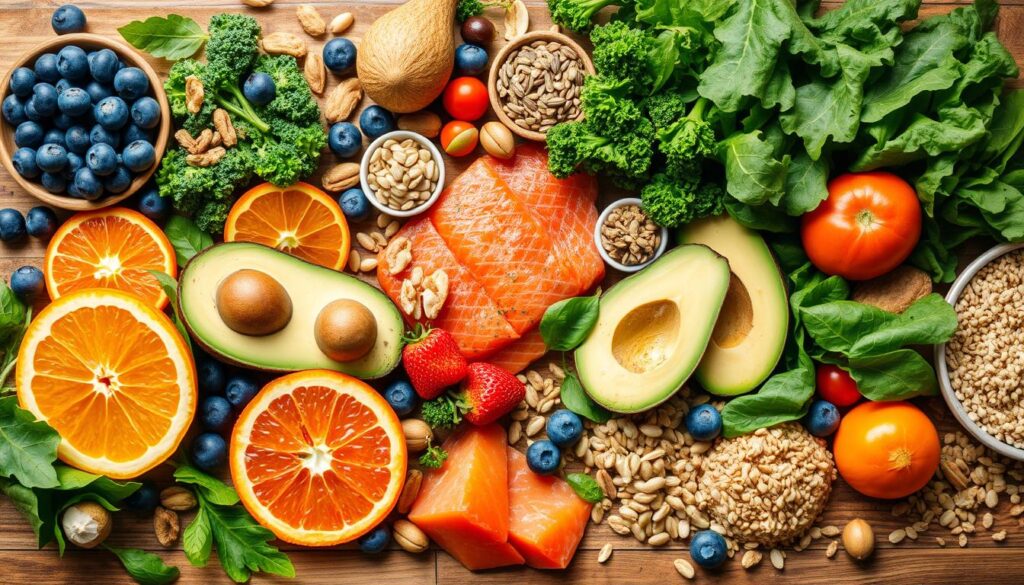
It’s key to eat a balanced diet to get the vitamins and minerals your body needs. Fresh fruits, vegetables, whole grains, and dairy products are great sources. They help you meet your daily needs for vitamins and minerals.
Fruits and Vegetables
Fruits and vegetables are packed with vitamins A, C, and K, plus minerals like potassium and magnesium. Eating a variety of colors ensures you get many nutrients. This makes them essential for a healthy diet.
Whole Grains
Whole grains, like whole wheat, oats, and brown rice, are full of B vitamins, iron, and fiber. Choosing whole grains over refined ones boosts your intake of these nutrients. They support your health and well-being.
Dairy Products
Milk, yogurt, and cheese are great for calcium, vitamin D, and riboflavin. These nutrients are vital for strong bones, a healthy immune system, and energy. Adding dairy to your meals helps you get the vitamins and minerals you need.
Eating a diet rich in fruits, vegetables, whole grains, and dairy is best. It ensures your body gets the vitamins and minerals it needs to stay healthy. These foods are a natural and effective way to support your health.
Benefits of Adequate Vitamin Intake
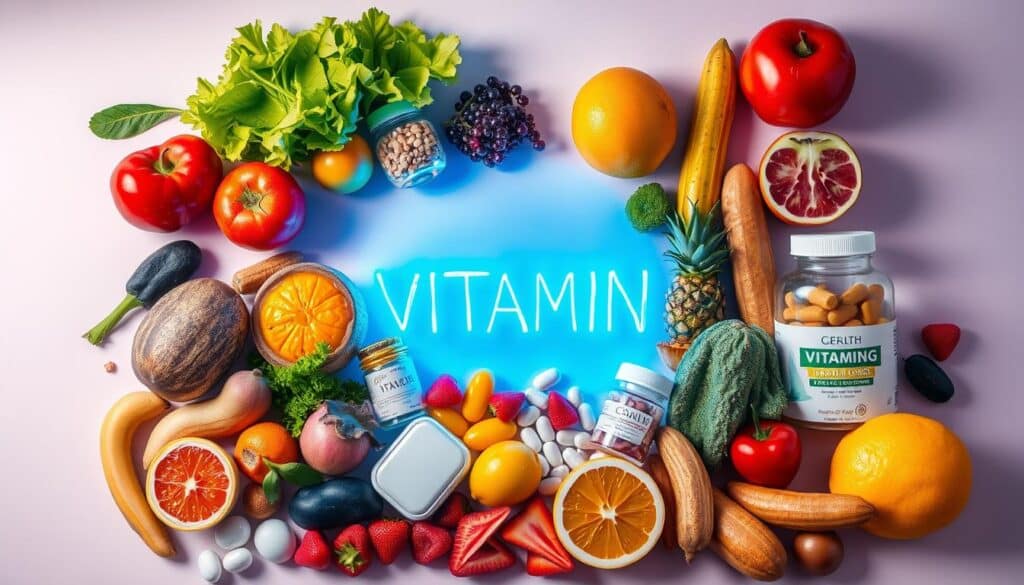
Getting enough vitamin intake is key for good health. Vitamin benefits help with many important body functions. These include keeping the immune system strong and helping make energy. By eating well or taking supplements, people can get many good health effects of vitamins.
Vitamins like C and D help fight off sickness and keep us healthy. They make our immune system work better. Vitamins A, E, and the B-complex are also vital. They help with growth, keeping cells healthy, and making new cells.
Adequate vitamin intake helps make red blood cells. These cells carry oxygen around the body. This boosts energy and helps us perform better in sports. Vitamins also protect cells from harm. This can lower the risk of heart disease and some cancers.
| Vitamin | Key Benefits |
|---|---|
| Vitamin A | Supports eye health, immune function, and skin health |
| Vitamin C | Enhances immune system, aids in collagen production, and acts as an antioxidant |
| Vitamin D | Promotes bone health, calcium absorption, and immune system function |
| Vitamin E | Serves as an antioxidant, supports immune system, and aids in skin health |
Getting enough vitamin intake brings many health benefits. Eating foods full of nutrients or taking supplements can help. This keeps our bodies healthy and supports our well-being for a long time.
Risks of Vitamin Deficiency
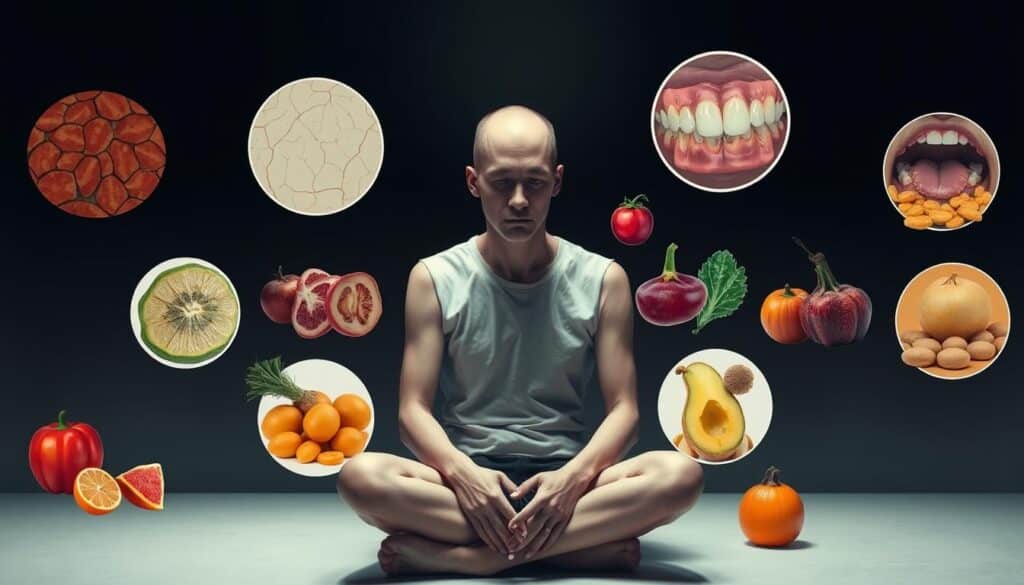
Vitamin deficiencies can seriously harm your health. Not getting enough essential vitamins can cause a lot of problems. It’s important to fix vitamin deficiency to stay healthy.
Symptoms of Deficiency
Signs of vitamin deficiency vary but include feeling tired, a weak immune system, slow healing, vision issues, and anemia. These problems can really affect your daily life and health.
- Fatigue and weakness
- Impaired immune function
- Slow wound healing
- Vision problems
- Anemia
Health Consequences
Long-term or severe vitamin deficiencies can cause serious health issues. These may include getting more infections, losing bone, having neurological problems, and even harming organs. People like the elderly, those with limited diets, and those with digestive issues are more likely to face these health effects of vitamin deficiency.
| Vitamin Deficiency | Potential Health Consequences |
|---|---|
| Vitamin A Deficiency | Night blindness, dry eyes, increased risk of infections |
| Vitamin D Deficiency | Bone loss, increased risk of fractures, muscle weakness |
| Vitamin C Deficiency | Scurvy, impaired wound healing, weakened immune system |
| Vitamin B12 Deficiency | Anemia, neurological problems, fatigue |
To stay healthy, fixing vitamin deficiencies is key. This can be done by eating better or taking supplements. Always talk to a healthcare provider before making any changes.
Also Read : Best Tips For Maintaining A Healthy Lifestyle
Conclusion
Vitamins and minerals are key for our health and body’s functions. Eating a balanced diet full of fruits, veggies, whole grains, and dairy gives us what we need. This supports our immune system, helps us grow, and lowers the risk of chronic diseases.
Vitamin supplements can help if we’re missing certain nutrients. But, eating a variety of nutrient-dense whole foods is best. These foods give us the vitamin importance and minerals our bodies need. By choosing wisely, we can improve our health and wellbeing.
Adding many nutrient-rich foods to our meals is key for good health. It makes sure our bodies get the vitamins and minerals they need to work well.
FAQs
Q: What are the essential vitamins for overall health?
A: There are 13 vitamins that are essential for overall health. These include vitamins A, C, D, E, K, and the B vitamins such as B1 (thiamine), B2 (riboflavin), B3 (niacin), B5 (pantothenic acid), B6 (pyridoxine), B7 (biotin), B9 (folate), and B12 (cobalamin). Each vitamin plays a vital role in various bodily functions, including growth, development, and tissue repair.
Q: How can I get the vitamins my body needs?
A: You can get the vitamins your body needs through a varied diet that includes fruits, vegetables, whole grains, proteins, and dairy. In some cases, if you cannot obtain sufficient vitamins from food, you may consider taking a vitamin supplement or dietary supplement that contains essential vitamins.
Q: What are water-soluble vitamins and why are they important?
A: Water-soluble vitamins include the B vitamins and vitamin C. They are important because they dissolve in water and are not stored in the body, which means you need to regularly consume them through food or supplements to maintain adequate levels. These vitamins are crucial for energy production, immune function, and overall health.
Q: Can I take vitamin supplements if I have a balanced diet?
A: While a balanced diet typically provides the necessary vitamins, some individuals, especially older adults, may have difficulty absorbing certain nutrients. In such cases, taking vitamin supplements may be beneficial to prevent vitamin and mineral deficiencies. It’s best to consult with a healthcare professional before starting any supplement regimen.
Q: What are some food sources rich in essential vitamins?
A: Food sources rich in essential vitamins include fruits, vegetables, nuts, seeds, and whole grains. For example, leafy greens are high in folate, dairy products provide vitamin D, and fish is a great source of vitamin B12. Incorporating a variety of these foods into your diet can help you get the vitamins you need.
Q: What is the recommended intake of iodine and why is it important?
A: Iodine is a trace mineral that is crucial for thyroid function and the production of thyroid hormones. The recommended intake varies by age, but adults typically need about 150 micrograms per day. Iodine can be found in food sources such as iodized salt, fish, dairy, and certain grains.
Q: How do vitamin and mineral deficiencies affect health?
A: Vitamin and mineral deficiencies can lead to various health issues, including impaired immune function, fatigue, and developmental problems. For instance, a deficiency in vitamin B6 may cause anemia, while a lack of vitamin D can lead to bone weakness. It’s important to monitor your intake of these essential nutrients to maintain overall health.
Q: What should I consider when choosing a dietary supplement?
A: When choosing a dietary supplement, consider factors such as the specific vitamins and minerals you may be lacking, the formulation of the supplement, and any dietary restrictions you may have. It’s also advisable to look for products that have been tested for quality and effectiveness by reputable organizations, such as the National Institutes of Health.
Q: Are there any risks associated with taking too many vitamins?
A: Yes, taking excessive amounts of certain vitamins, particularly fat-soluble vitamins like A, D, E, and K, can lead to toxicity and adverse health effects. It’s important to adhere to the recommended amounts and consult with a healthcare provider if you are considering high-dose supplements.
Source Links
- https://www.nia.nih.gov/health/vitamins-and-supplements/vitamins-and-minerals-older-adults
- https://medlineplus.gov/ency/article/002399.htm
- https://health.clevelandclinic.org/which-vitamins-should-you-take


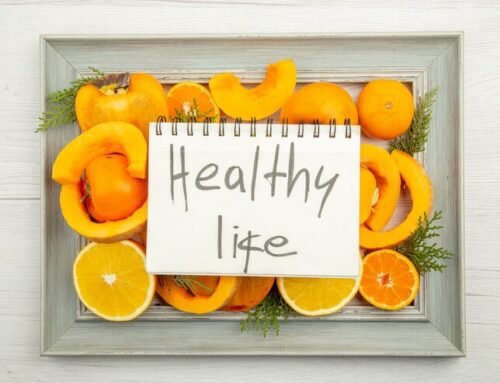



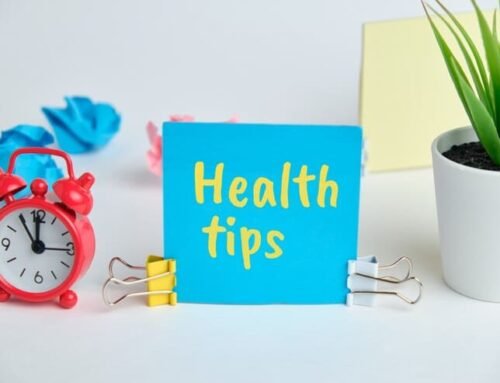
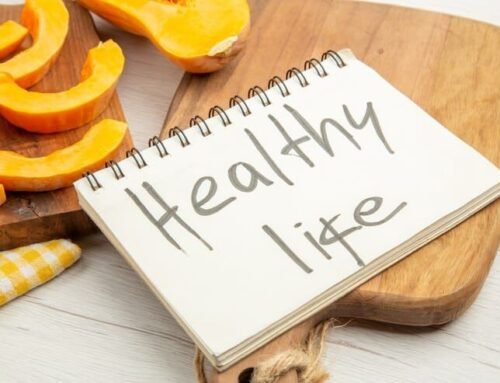
Leave A Comment